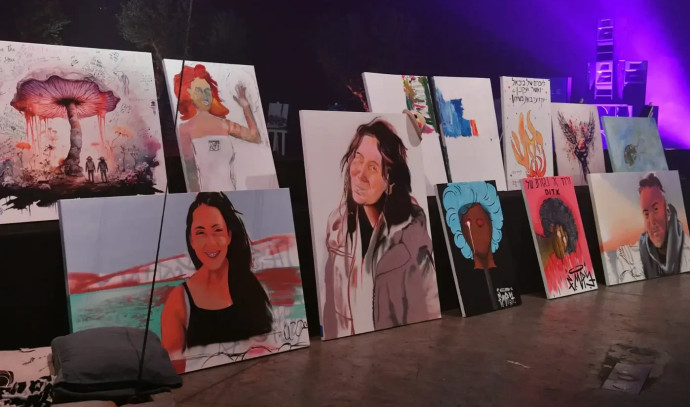KIBBUTZ HAZOREA, Israel — Fifteen young men and women, seemingly oblivious to their surroundings and to each other, dance around a bucolic field, twisting their bodies to trance music blasting through their headphones.
Beyond their earphones is silence, except for the constant rumble of fighter jets taking off from Ramat David air base in the nearby Jezreel Valley.
Yet the aircraft and the dancers are connected.
Some of these jets are heading south toward Gaza, to bomb the hideouts and munitions storehouses of Hamas terrorists who on Oct. 7 killed 1,200 Israelis — including some 360 attendees of the Nova music festival that took place that morning in a field near Gaza. In recent weeks, survivors of the massacre at the Nova rave have been coming to this retreat center at Kibbutz Hazorea to try to overcome their trauma.
“This is the first time I’ve danced since that day,” said Noa Maman, 21, of Yokneam. “It’s been very hard for me.”
Trying to heal a wound
About 60 people have participated so far in the trauma recovery program being run by Free Spirit Experience, a nonprofit group that in normal times uses its facilities at Hazorea (and another one in Cyprus) for treatment programs for young Jewish adults from Israel and abroad suffering from anxiety, depression, or drug or alcohol problems.
Free Spirit repurposed its trauma treatment program within two weeks of Oct. 7, launching the first of its three-day therapeutic workshops for Nova survivors on Oct. 23. Since then it has held six more, each with five to 15 participants and at no cost to attendees.
“We had a staff member whose cousin was injured in the festival; Each of us knew somebody who was there,” said Free Spirit’s managing director, Rami Bader. “We talked about the trauma these people might have and decided to use our resources to help them.”
Using yoga, pottery making, dancing, acupuncture, carpentry and even ice baths, survivors of the massacre gradually come out of their shells and begin to talk. The idea is to give participants a sense of safety and community to share and talk about their emotions. Some are able to open up in group therapy sessions; for others it happens over communal activities like preparing meals.
“When we have our first group meeting, some have been waiting for the opportunity to tell their stories, but not all of them,” Bader said. “By the end all of them share, but not because we pushed them. Many times, it’s not even us. We just sit there and they share among themselves.”
Trauma survivors who seek help early on have a chance to build resilience rather than develop PTSD, experts say.
“We know that post-traumatic stress disorder can develop a few months after the trauma, or years after,” Bader said.
Omer Ovadia, 24, lost three of his best friends in the Nova attack. He has memorialized them with a tattoo on his right forearm bearing their names: Dvir, Lia and Sahar.
“It was about 6:30 a.m. when Hamas started to shoot rockets,” Ovadia recalled. “Immediately, they stopped the music and everybody ran to their cars. We started driving, but after seven minutes terrorists came running after us with RPGs and grenades, running after everybody. We quickly left the car and started running east, toward Patish. I remembered my army survival skills, so we zigzagged left and right, kicking up dust so they couldn’t see or shoot at us.”
By 3 p.m, over eight hours after the attack began, Ovadia and 20 others — all hungry, thirsty and filthy — arrived at Patish. Dozens of others in their group, including his three friends, didn’t make it. Some of his friends were taken captive to Gaza.
The trauma starting to hit him that evening.
“I was sitting in a car and started to cry, realizing what we had been through,” Ovadia said. “Even now I still don’t know the depth of the trauma.”
Tamir Rotman, a psychologist and Free Spirit’s clinical director, said survivors of massacres often feel extremely agitated, tortured by flashbacks and unable to leave home. He tries to help them find stability and a sense of normalcy.
“The huge factor is alleviating guilt and self-criticism,” Rotman said. “It’s very typical for people who go through extreme situations to feel survivor’s guilt. For example, some will say, ‘I pushed my friends to come, but I survived and they didn’t.’ Or ‘Why didn’t I fight back?’ These are normal mechanisms that our brain uses to try to gain some control over the situation.”
Many participants in Free Spirit’s program say that being in the sheltered environment at Hazorea has helped them find some relief. Maman said it took her two months just to gather the strength to spend a night away from home and come to Hazorea. She still hasn’t been able to return to her job.
“I’m not working at all now. I can’t focus my attention on anything specific for more than a few hours because it takes too much energy,” Maman said. “I’m exhausted. My head is always taking me back to that day.”
She added, “After what happened, it was really hard to trust other people and open up like this. But this experience has given me hope. There are good people with good intentions, and there’s a future for humanity.”
After several sessions, Bader is trying to raise the funds necessary to keep the program going. Each three-day workshop costs $40,000, and Bader says Free Spirit needs to raise $200,000 because its other revenue-generating programs are on hold due to the war. (Supporters can contribute online to support the program at freespiritexperience.org/donate.)
Free Spirit has moved its regular therapy programs treating anxiety, depression, and alcohol and drug issues to its site in Cyprus. That program, which caters to Jews from around the world and includes Jewish components, aims at fostering wellbeing and a sense of purpose through communal activities and therapeutic care. A similar philosophy guides Free Spirit’s unique Oct. 7 trauma program.
Ido Cohen of Yokneam decided to try Free Spirit after struggling to recover from his Nova experience on his own.
When the attack began on Oct. 7, Cohen, 21, a project manager at a human resources firm who makes trance music in his spare time, thought the booms he was hearing were coming from the show stage. Then he saw rockets exploding in the air and everyone rush for the exits. Sleep-deprived and high on ecstasy, Cohen said, he and his friends had trouble finding their car. As soon as they began driving they heard gunshots and saw other cars with bullet holes and shattered glass littering the road.
They started running through the fields, hiding in trenches and inside bushes amid explosions and gunfire. Six and a half hours would pass before they reached a dirt road where a vehicle took them to safety at Patish.
Cohen said his life hasn’t been the same since.
“I was a heavy weed smoker before this attack,” he said. “After Oct. 7, I stopped smoking. I stopped eating. I stopped living. I didn’t leave my house for two weeks. It was pure hell. I don’t think it’s a question of time. This will be a part of my life forever. I just need to accept it.”
Recovery can take a long time. Ovadia has come back to Free Spirit for three rounds of therapy, finding each time a greater degree of confidence and optimism about the future. He says he believes it will take him a year or two to recover emotionally.
“I have no doubt that in the end I’m going to be fine,” Ovadia said. “And I’m sure I’ll be stronger.”
This story was sponsored by and produced in collaboration with Free Spirit Experience, a unique therapy program in Israel where at-risk teens and young adults from all over the world can have meaningful communal experiences away from home. The story was produced by JTA’s native content team.




